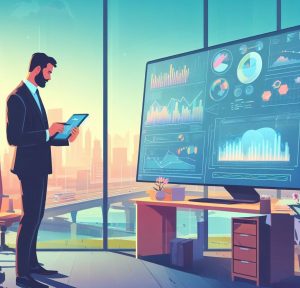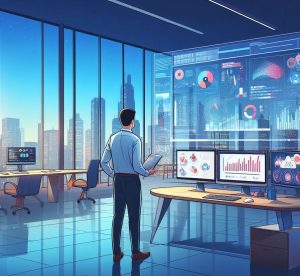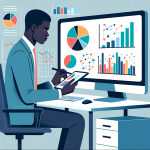What Does a Data Visualization Specialist Do?
Data Visualization Specialists are the experts in transforming complex data into understandable and engaging visual presentations. They work closely with data analysts, data scientists, and other professionals to extract insights from data and communicate them effectively.
Their tasks include, among others:
- Analyzing datasets and identifying trends and patterns.
- Designing and developing visual representations of data, such as graphs, charts, maps, and dashboards.
- Applying best practices in data visualization and design to ensure the usability and effectiveness of visual presentations.
- Collaborating with other departments to ensure accurate and timely reporting of data and insights.
- Continuously improving and updating visualization tools and techniques to enhance the efficiency and effectiveness of data visualization processes.

Job Profile of a Data Visualization Specialist
A typical job profile of a Data Visualization Specialist includes:
- A relevant academic background, such as computer science, statistics, design, or a related field.
- Experience with working with data analysis and visualization tools, such as Tableau, Power BI, D3.js, or R.
- Strong analytical and problem-solving skills.
- Creative and innovative thinking to present complex data in a visually appealing and understandable way.
- Excellent communication skills to collaborate with various stakeholders and effectively communicate insights from data.
A Day in the Life of a Data Visualization Specialist
A Data Visualization Specialist often starts the day by checking existing data visualizations for accuracy and relevance. Throughout the day, he/she works closely with data analysts, researchers, and other stakeholders to understand complex datasets and visually represent their essence. This is done by designing and implementing interactive dashboards, charts, and other visual tools. The specialist takes into account the needs of the target audience and ensures that the visualizations are intuitive and insightful. Feedback sessions and revisions are an essential part of the process, with the specialist constantly seeking improvements. The goal is always to make data understandable and accessible to a wide audience.

What tools does a Data Visualization Specialist use?
Data Visualization Software
This includes tools such as Tableau, Power BI, Looker, and Qlik, which enable data visualization specialists to transform complex data into clear and visually appealing dashboards and reports. These tools make it possible to uncover patterns, trends, and insights in data and communicate them intuitively with stakeholders. Furthermore, newer versions of these tools are increasingly supported with AI-powered functionalities, making advanced analyses easier and faster to execute.
Programming Languages for Data Science
Python and R remain the leading programming languages in data science and visualization. With powerful libraries like Matplotlib, Seaborn, and ggplot2, users can create detailed and customized visualizations. Python is particularly powerful due to its broad integration with machine learning and AI frameworks, making it suitable for predictive analytics and automation of visualization processes.
Data Manipulation and Cleaning Tools
For cleaning and manipulating data, tools like Trifacta, Alteryx, and open-source options like OpenRefine are becoming increasingly popular. These tools offer advanced functionalities for transforming raw data into structured formats, which is essential for generating reliable and meaningful visualizations. The integration of AI-powered data cleaning processes is also an important trend that is being applied more often to minimize human errors and increase efficiency.
Advanced Analytical Tools
Advanced analytical tools such as MATLAB, SPSS, and SAS are often used for in-depth analyses that can be visually presented. These tools offer extensive statistical techniques, including predictive analytics and machine learning, providing critical insights for data-driven decision-making. The rise of generative AI and deep learning models has also significantly expanded the possibilities for advanced data analysis.
Web Technologies for Interactive Visualizations
Knowledge of web technologies like HTML, CSS, JavaScript, and D3.js is essential for developing interactive and dynamic data visualizations that can be seamlessly integrated into web pages and mobile applications. The increasing demand for real-time visualizations makes the use of JavaScript frameworks like React or Vue.js more relevant for developing modern web-based data dashboards.
Cloud-based Data Storage
Cloud storage platforms like Google Cloud Storage, Amazon S3, and Azure Blob Storage are indispensable for managing and sharing large datasets. These platforms not only offer scalability but also integration with various data analysis tools and visualization platforms. Due to the continuous growth of big data, cloud storage has become the standard for data analysis and visualization, with enhanced security measures and easier dataset management.
Data Management and Database Knowledge
A thorough understanding of SQL and experience with databases like MySQL, PostgreSQL, and cloud-based systems like Amazon Redshift and Google BigQuery is essential for efficiently retrieving and managing data for visualization. New tools and technologies like NoSQL databases and graph databases are also gaining popularity for specific use cases, such as analyzing unstructured or relational data.
Collaboration and Version Control Tools
The use of collaboration and version control tools like Git and GitHub, or alternatives like Bitbucket, is crucial for effectively working in teams, tracking code changes, and sharing visualization designs. The integration of CI/CD (Continuous Integration/Continuous Deployment) in data analysis processes is increasingly being applied to improve project efficiency, especially for teams working with complex data pipelines and models.
What does a Data Visualization Specialist earn?
A Data Visualization Specialist with a few years of experience can expect a salary ranging from €3,500 to €6,000 per month. This salary can increase depending on the level of experience, responsibilities, and location. For more experienced Data Visualization Specialists with an extensive portfolio and in-depth expertise, the salary can even reach €7,500 per month. The following levels can be used as a guideline:
- Junior Data Visualization Specialist: €3,500 to €4,500 per month.
- Medior Data Visualization Specialist: €4,500 to €5,500 per month.
- Senior Data Visualization Specialist: €5,500 to €7,500 per month.
The final compensation also depends on the type of organization, the sector in which one works, and the geographical area. Specialists with a strong technical background in tools such as Tableau, Power BI, and D3.js may even expect higher salaries in some cases.
Career Path and Growth Opportunities as a Data Visualization Specialist
A career as a Data Visualization Specialist offers numerous growth opportunities. As you gain experience and further develop your expertise in data visualization and analysis, you can advance to more senior or leadership roles, such as Data Visualization Manager, Head of Data Visualization, or even Chief Data Officer. You may also choose to specialize in a specific industry or sector, such as healthcare, financial services, technology, or e-commerce. Additionally, there are opportunities to transition to related roles, such as data analyst, data scientist, or business intelligence analyst. You can also work as an independent consultant or trainer, offering your expertise in data visualization to various clients and organizations. This can provide more flexibility and diversity in your work.

Training and Certification for Data Visualization Specialists
To be successful as a Data Visualization Specialist, it is important to continuously invest in your knowledge and skills. In addition to a relevant academic background, there are various courses and certifications available that can help you further expand your expertise in data visualization. Some popular certifications and courses include:
Tableau Desktop Specialist
This certification, offered by Tableau, demonstrates that you possess the essential knowledge and skills in data visualization and analysis using Tableau software. It focuses on applying basic techniques in Tableau to effectively visualize and analyze data.
Microsoft Certified: Data Analyst Associate
This certification, offered by Microsoft, focuses on demonstrating your skills in working with Power BI to analyze data, create reports, and build interactive visualizations. This certification is an important step for those looking to strengthen their Power BI skills.
D3.js Training and JavaScript Visualization
There are several courses and workshops available that focus on working with the popular JavaScript library D3.js. D3.js is a powerful tool for creating complex and interactive data visualizations on the web. Courses cover everything from the basics of D3.js to advanced techniques for creating dynamic visualizations that can respond to user interactions.
Networking and Industry Associations
Industry Associations
It is crucial to remain actively involved in the data visualization community and to stay up-to-date with the latest trends, innovations, and best practices in data visualization and data analysis. This can be achieved by joining industry associations, such as the Data Visualization Society and the International Association for Data Science & Analytics (IADSA). Attending key conferences, such as the Visualizing Data Conference and IEEE VIS, not only provides the opportunity to discover new techniques and technologies but also to network with experts and colleagues in the industry. Additionally, building a strong network of professionals, both online and offline, is essential for the personal and professional growth of a Data Visualization Specialist.
Online
There are several online platforms where Data Visualization Specialists and data analysis professionals can be active, such as specialized LinkedIn groups, Reddit forums, and Discord channels. These platforms offer an excellent opportunity to share experiences, knowledge, and insights. They are also an ideal place to share portfolio work, get feedback from other professionals, and discuss the latest tools and techniques in data visualization. By actively participating in these online communities, Data Visualization Specialists can make valuable connections, learn best practices, and expand their network, which can lead to new career opportunities and collaborations.

Application Tips for Data Visualization Specialists
Build a Strong Portfolio
To convince potential employers and clients of your skills in data visualization, it's important to build a strong portfolio with examples of your work. These can be projects you completed during your studies or in previous roles, as well as personal projects that showcase your passion and expertise in data visualization.
Stay Updated on Trends and Technologies
The field of data visualization is constantly evolving, and it's important to stay up-to-date with the latest trends, techniques, and technologies. Follow leading experts and organizations on social media, read relevant blogs and articles, and participate in webinars and workshops to keep your knowledge current.
Practice Your Communication Skills
A key aspect of a successful Data Visualization Specialist is the ability to communicate complex information in an understandable and persuasive manner. Practice your communication skills by giving presentations, participating in conversations and discussions about data visualization, and writing blog posts or articles on relevant topics.
Network
Leverage your existing network and expand it by attending events, conferences, and online forums. A strong network can help you discover new opportunities, form collaborations, and gain valuable insights from other professionals in the field.
Prepare Well for Job Interviews
Make sure to thoroughly research the company you have a job interview with and familiarize yourself with the data visualization tools and techniques they use. Be prepared to talk about your experience, skills, and projects you've completed, as well as to answer questions on how you would apply data visualization to specific situations or problems the company may face.

By following these tips, you increase your chances of success when applying for roles as a Data Visualization Specialist and building a successful career in this exciting and growing field.
Impact and Social Relevance
A Data Visualization Specialist plays a crucial role in today's data-driven society. They transform complex data sets into understandable, visual representations. This makes it easier for decision-makers and the general public to interpret and understand data. The societal relevance lies in increasing transparency and insight, especially in sectors such as healthcare, policy, and education. By presenting data in a visually appealing and accessible way, the specialist promotes a broader understanding of important topics and enables organizations to make informed, data-driven decisions. In an era where "big data" is central, the Data Visualization Specialist contributes to an informed society by bridging the gap between complex data and everyday decision-making.
Case Study: The Role of Data Visualization Specialist
Background
In the rapidly evolving e-commerce landscape of WebShopCo, a dynamic online retail company, data was crucial but insufficiently accessible to decision-makers. Although there was an abundance of customer and sales data available, clear and actionable insights that could contribute to strategic decision-making and market analysis were lacking.
The Challenge
Essential data was fragmented across different platforms and departments. While complex datasets were available, they were not optimized for interpretation by non-technical staff, such as marketers and product managers. As a result, potentially valuable information was not being translated into tactical and strategic actions.
Action by the Data Visualization Specialist
Joris, as a Data Visualization Specialist, was brought in to make data more understandable and accessible. He developed interactive dashboards that provided real-time insights, customized for each department, so that everyone, from marketing to finance, could quickly and easily access relevant data. He took usability into account to maximize adoption by all stakeholders.
Result
Thanks to the created dashboards, data was transformed into visually understandable information, significantly improving strategic and operational decision-making within WebShopCo. Departments were able to make data-driven decisions, resulting in a more efficient approach, targeted marketing strategies, and ultimately an increase in revenue and customer satisfaction. Joris’s expertise in data visualization became an essential link in connecting data with decision-making.

Vacancies for Data Visualization Specialists
View here current job openings for Data Visualization Specialists on DataJobs.nl
Looking for a Data Visualization Specialist?
For a small fee, you can easily post your job vacancies on our platform and reach our large, relevant network of data and analytics specialists. Applicants will respond directly to you, without third-party involvement.
On DataJobs.nl, we bring supply and demand in the data and analytics job market directly together—without intermediaries. You won't find job vacancies from recruitment agencies here. Visitors can view all job listings for free and apply directly without an account.
Check the options for posting job vacancies here. Have questions? Contact us!
Op zoek naar een uitdaging in data & analytics?
Bekijk hier alle actuele kansen! See vacancies- What Does a Data Visualization Specialist Do?
- Job Profile of a Data Visualization Specialist
- A Day in the Life of a Data Visualization Specialist
- What tools does a Data Visualization Specialist use?
- What does a Data Visualization Specialist earn?
- Career Path and Growth Opportunities as a Data Visualization Specialist
- Training and Certification for Data Visualization Specialists
- Networking and Industry Associations
- Application Tips for Data Visualization Specialists
- Impact and Social Relevance
- Case Study: The Role of Data Visualization Specialist
- Vacancies for Data Visualization Specialists
- Looking for a Data Visualization Specialist?


